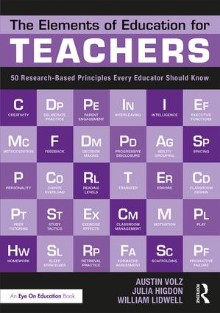Elements of Education for Every Educator
The Elements of Education for Teachers: 50 Research-Based Principles Every Educator Should Know
By Austin Volz, Julia Higdon and William Lidwell
(Routledge/Eye On Education, 2019 – Learn more)

A must have for every teacher’s library, The Elements of Education for Teachers: 50 Researched-Based Principles Every Educator Should Know by Austin Volz, Julia Higdon and William Lidwell is the book to pick up now.
This is not your typical read. It is streamlined to provide exactly what you need while giving you the resources to delve more deeply into each “element” (strategy) if you choose, or more likely, when you have more time.

Page two is the place to look if you are really short on time. This is where the authors have formatted the research into bulleted Do’s, Don’ts, and a Reflective Passage making this not only a fabulous resource for your bookshelf, but also the perfect professional book to read during the school year.
A well-rounded set of principles
The authors chose a well-rounded set of principles for inclusion within the book – some that have received more current press than others. They offer the staples of classroom management, project-based learning and technology-based learning along with the gems of choice overload, serial position effects and sleep strategies. There may be parts of this book that you are very familiar with; however, there are definitely parts that will spark your creative juices and bring more depth to your craft
While I enjoyed reading through each element, there are a few that I can’t wait to put into practice in my classroom. I had never thought of CO2 build up in the classroom, but there it was, tucked into element 8. “Well-ventilated classrooms are essential to minimize CO2 build up – a common but generally unrecognized problem that impairs cognitive function – especially in small classrooms.” That alone will change my behavior during the colder months when windows are kept closed and students seem less attentive.
Element 42 is something I’d like to post on a site or send home to parents. It covers sleep strategies as “techniques to ensure quality sleep so as to promote memory formation and overall cognitive functioning.” While this is a well-covered topic, the easily accessible and concise manner in which it is covered here reinforces the importance of sleep in a memorable way.
I’m not going to tell you all of the elements that I found helpful. Pick up the book, skim through it, find the element that you are drawn to at this time, and go for it. You won’t be disappointed.
Diane Kaplan is an adventure seeking 13-year veteran teacher currently serving as a middle school special education teacher. She has taught in both private and public settings, and at intermediate, middle and high school levels. Holding a BA in History and an MEd in Special Education, Diane is Teachers College trained and has been a member of Kappa Delta Pi, NJAMLE, and NCSS.

































